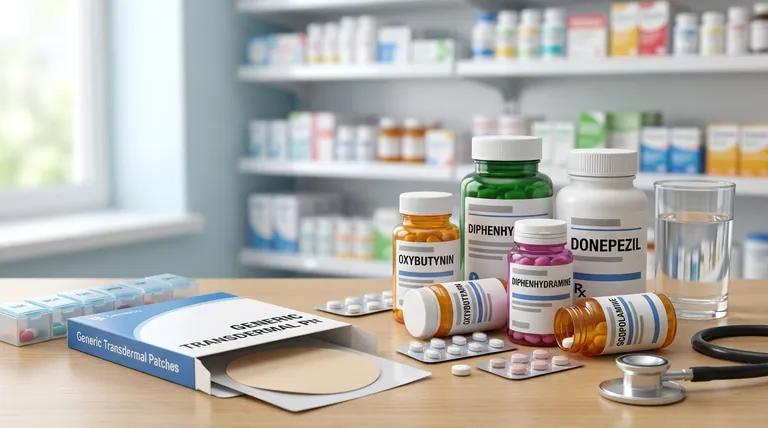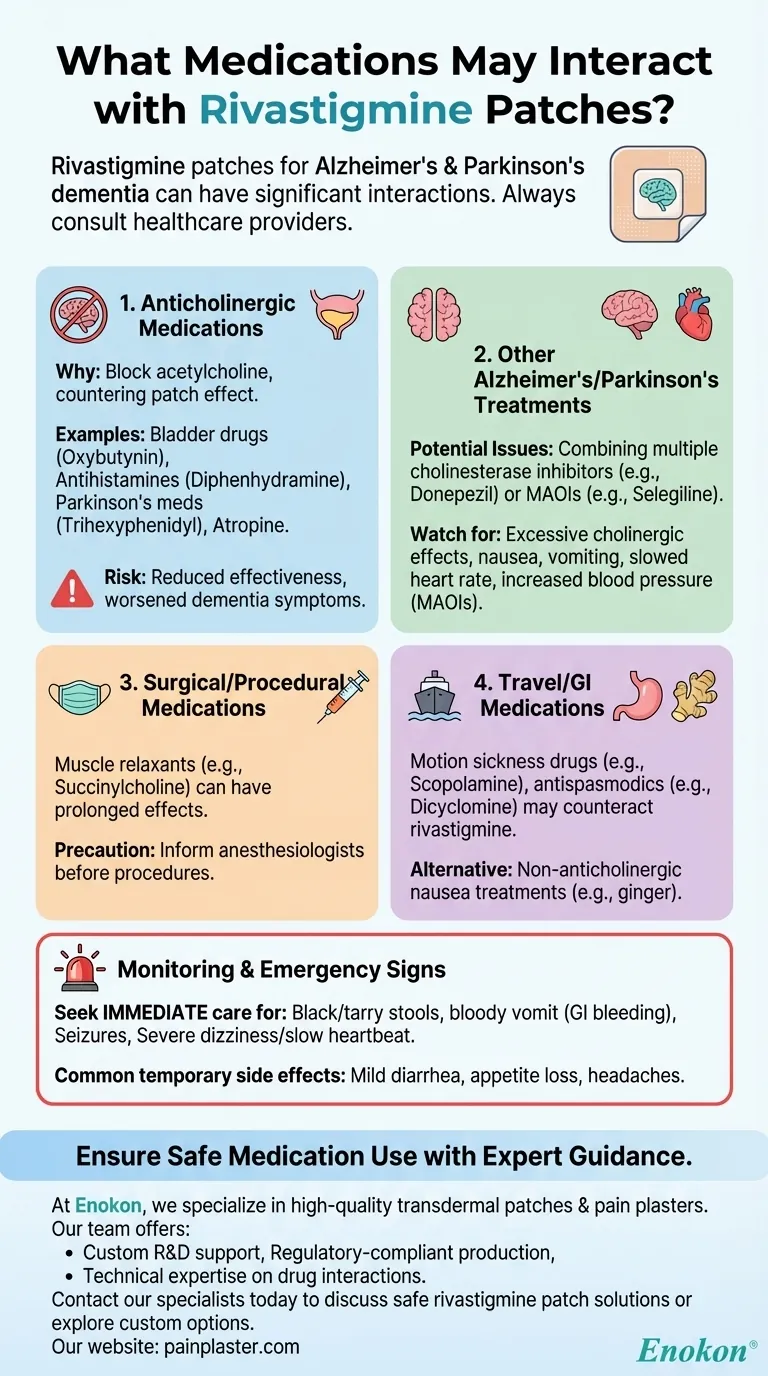Rivastigmine patches, used to treat dementia symptoms in Alzheimer's and Parkinson's disease, can interact with several medication classes. These interactions may increase side effects or reduce effectiveness. Key interacting drugs include anticholinergics (like bladder medications and antihistamines), other Alzheimer's treatments, and certain surgical medications. Patients should monitor for serious side effects like gastrointestinal bleeding or urinary changes and always disclose all medications to their healthcare provider.

Key Points Explained:
-
Anticholinergic Medications
- Why they interact: Rivastigmine works by increasing acetylcholine levels, while anticholinergics block this neurotransmitter.
- Examples:
- Bladder control drugs (e.g., oxybutynin)
- Antihistamines (e.g., diphenhydramine) for allergies/colds
- Parkinson's medications (e.g., trihexyphenidyl)
- Atropine (used for heart/eye conditions)
- Risk: Reduced effectiveness of the Rivastigmine Patch and worsened dementia symptoms.
-
Other Alzheimer's/Parkinson's Treatments
- Potential issues: Combining multiple cholinesterase inhibitors (e.g., donepezil) may cause excessive cholinergic effects.
- Watch for: Nausea, vomiting, diarrhea, or slowed heart rate.
- Special case: MAOIs (like selegiline) may increase blood pressure.
-
Surgical/Procedural Medications
- Muscle relaxants (e.g., succinylcholine) used in surgery can have prolonged effects when combined with rivastigmine.
- Precaution: Inform anesthesiologists about patch use before any procedure.
-
Travel/GI Medications
- Motion sickness drugs (e.g., scopolamine) and antispasmodics (e.g., dicyclomine) may counteract rivastigmine.
- Alternative: Non-anticholinergic nausea treatments like ginger.
-
Monitoring & Emergency Signs
- Seek immediate care for:
- Black/tarry stools or bloody vomit (GI bleeding)
- Seizures or uncontrollable movements
- Severe dizziness/slow heartbeat
- Common side effects (usually temporary): Mild diarrhea, appetite loss, or headaches.
- Seek immediate care for:
Always provide your doctor with a complete medication list, including over-the-counter drugs and supplements, to avoid dangerous interactions. Dose adjustments or alternative treatments may be needed for safe co-administration.
Summary Table:
| Medication Class | Examples | Interaction Risk |
|---|---|---|
| Anticholinergics | Oxybutynin, diphenhydramine | Reduces rivastigmine effectiveness; worsens dementia symptoms |
| Other Alzheimer's Drugs | Donepezil, selegiline | Excessive cholinergic effects (nausea, vomiting, slowed heart rate) |
| Surgical Medications | Succinylcholine | Prolonged muscle relaxant effects during procedures |
| Travel/GI Drugs | Scopolamine, dicyclomine | Counteracts rivastigmine; opt for non-anticholinergic alternatives (e.g., ginger) |
Ensure Safe Medication Use with Expert Guidance
Rivastigmine patches require careful management to avoid harmful interactions. At Enokon, we specialize in manufacturing high-quality transdermal patches and pain plasters for healthcare distributors and pharma brands. Our team offers:
- Custom R&D support to tailor formulations for your patients' needs
- Regulatory-compliant production for reliable drug delivery
- Technical expertise to navigate complex drug interactions
Contact our specialists today to discuss safe rivastigmine patch solutions or explore custom development options.
Visual Guide

Related Products
- Herbal Eye Protection Patch Eye Patch
- Far Infrared Heat Pain Relief Patches Transdermal Patches
- Far Infrared Deep Heat Relief Patches Medicated Pain Relief Patches
- Asthma Cough and Pain Relief Patch for Adults and Kids
- Menthol Gel Pain Relief Patch
People Also Ask
- How do eye patches enhance the effectiveness of eye creams? Boost Your Eye Care Routine
- What are the main benefits of using eye patches in a skincare routine? Revitalize Your Under-Eye Area
- Can under eye patches smooth fine lines and wrinkles? Hydrate & Plump for Youthful Skin
- What factors should be considered when purchasing eye patches? Essential Guide for Safe & Effective Use
- Should under eye patches be applied before or after moisturizer? Optimize Your Skincare Routine















